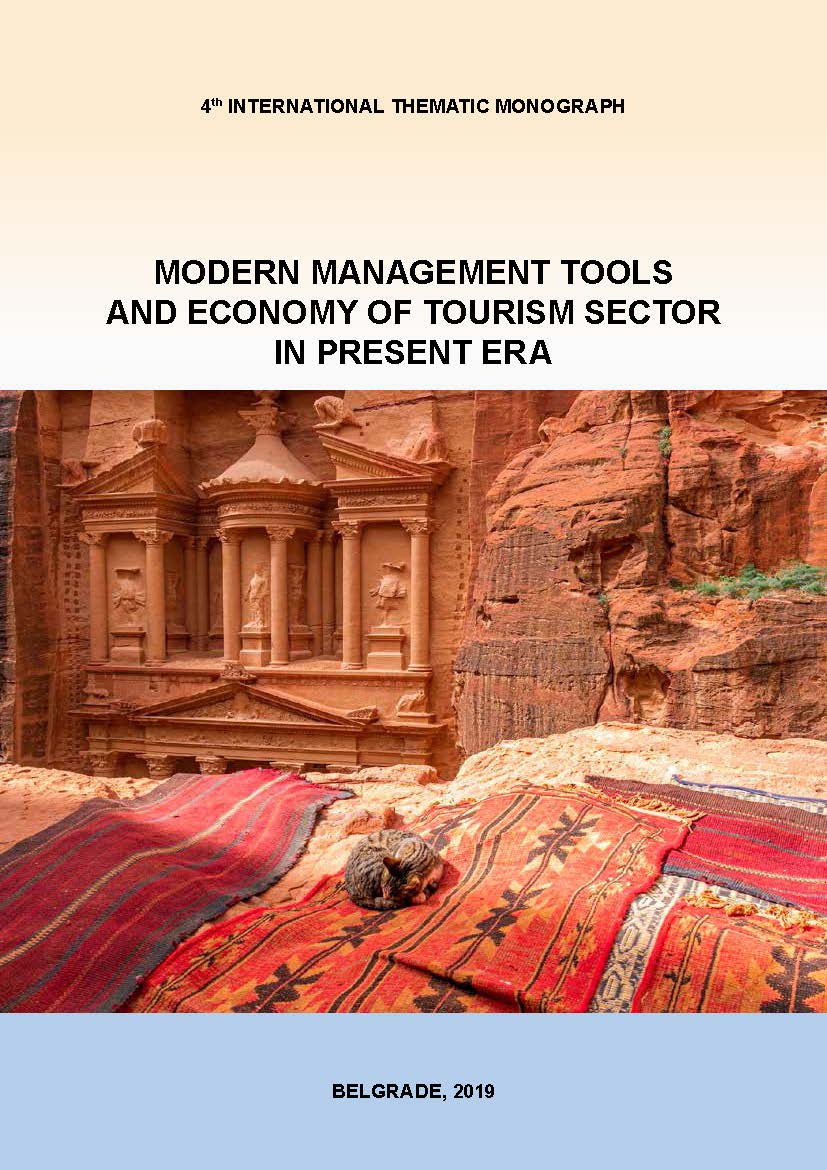|
SETTLEMENT COMPETITIVENESS IN THE BALATON REGION – THE POPULATION’S PERCEPTIONS Hajnalka Fekete – Berzsenyi University of Pannonia, Hungary, 8200 Veszprém, Egyetem u. 10. DOI: https://doi.org/10.31410/tmt.2019.31 4th International Thematic Monograph - Modern Management Tools and Economy of Tourism Sector in Present Era, Belgrade, 2019, Published by: Association of Economists and Managers of the Balkans in cooperation with the Faculty of Tourism and Hospitality, Ohrid, North Macedonia; ISSN 2683-5673, ISBN 978-86-80194-29-5; Editors: Vuk Bevanda, associate professor, Faculty of Social Sciences, Belgrade, Serbia; Snežana Štetić, full time professor, The College of Tourism, Belgrade, Serbia, Printed by: SKRIPTA International, Belgrade
|
|
Abstract: The subjects of this research are the residents of the Balaton Region, those who have a secondary home, a holiday home and those who work / study there. The aim of the research is to find out which local competitiveness factors are important to the examined population and to what extent they are satisfied with their quality. A questionnaire survey was used to answer these questions. In the course of the research, 27 variables were examined, whose groups of variables are: municipal services, economic factors, leisure and tourism factors, demographic factors, settlement characteristics. During the evaluation of results, the importance and satisfaction scores and their differences for each settlement factor were examined. From the results, we expect the differences in importance-satisfaction scores to be greatest in the municipal services variable group. Knowing the differences between importance and satisfaction can help practical decision-makers to direct regional and local development resources towards the well-being and quality of life of the population in the Balaton Region. Keywords: Settlement factors, Ranking by Importance, Ranking by Satisfaction. REFERENCES Aubert, A. (2011). Turizmus trendek és térszerkezet Magyarországon. Pécs, Hungary: Pécsi Tudományegyetem Természettudományi Kar - Publikon Kiadó Balaton Fejlesztési Tanács, Oláh, M. (Ed.). (2013-2014). Balaton Kiemelt Térség Fejlesztési Programja Helyzetértékelés I. Kötet: Balatoni Integrációs és Fejlesztési Ügynökség Nonprofit Kft. Bristow, G. (2005). Everyone’s a ‘winner’: problematising the discourse of regional competitiveness. Journal of Economic Geography, 5(3), 285-304. https://doi.org/10.1093/jeg/lbh063 Brown, J. D. (2011). Likert items and scales of measurement?, SHIKEN: JALT Testing & Evaluation SIG Newsletter, March, 15(1) 10-14. http://hosted.jalt.org/test/PDF/Brown34.pdf Budd, L., & Hirmis, A. (2004). Conceptual framework for regional competitiveness. Regional Studies, 38(9), 1015-1028. https://doi.org/10.1080/0034340042000292610 Chimi, J. C., Russell, L. D. (2009): The Likert Scale: A Proposal for Improvement Using Quasi- Continuous Variables. Proc ISECON, v26, Washington DC, 1-10. https://pdfs.semanticscholar. org/c101/cc033b78a24a3cef06829cb0e3d215aa78d2.pdf Győrffy, Á. (2017). Balatoni Kiemelt Turisztikai Térség – Avagy ki fér hozzá a mézesbödönhöz, https://www.balatontipp.hu/balatoni_hirek/balatoni-kiemelt-turisztikai-terseg-avagy- ki-fer-hozza-a-mezesbodonhoz/ Hoffman, I. (2018). Hungarian counties and regional development–Changing roles in a transforming environment. Deturope: Central European Journal of Tourism and Regional Development, 10(3), 162-179. http://www.deturope.eu/img/upload/content_98295042.pdf Kehl, D. (2016). Mintaelemszám tervezés Likert-skálás lekérdezések esetén klasszikus és bayesi keretek között, Pécs, Hungary: Pécsi Tudományegyetem, Közgazdaságtudományi Kar Kitson, M., Martin, R., & Tyler, P. (2004). Regional competitiveness: an elusive yet key concept? Regional Studies, 38(9), 991-999. https://doi.org/10.1080/0034340042000320816 Koltai, Z. (2005). A magyarországi városok versenyképességének lakossági megítélése, Tér és Társadalom, 19. évf, 3-4. 23-41. https://doi.org/10.17649/TET.19.3-4.1017 Koltai, Z., Lengyel I. – Nagy B. (Ed.). (2016). Városok vonzereje országos és regionális léptékben: Térségek versenyképessége, intelligens szakosodása és újraiparosodása, JATEPress Lengyel, I. (2000). A regionális versenyképességről, Közgazdasági Szemle, 47. évf., december, 962–987. https://epa.oszk.hu/00000/00017/00066/pdf/lengyel.pdf Lipták, K. (2019). Analysis of the Factors od Social Innovation of Social Innovation and Competitiveness in Hungary. People: International Journal of Social Sciences, 5(3). https://doi. org/10.20319/pijss.2019.53.8098 Majerova, I. (2018). Regional development and its measurement in Visegrad Group countries. Deturope: Central European Journal of Tourism and Regional Development, 10(2), 17-37. http://www.deturope.eu/img/upload/content_38090529.pdf Marien, A. (2013): A lakossági elégedettség és a helyben maradást magyarázó tényezők összefüggései. Marketing & Menedzsment, 2013/1, 3-10 http://real.mtak.hu/11427/ Marton I. (2013). A Balaton régió fejlődése - A regionális gondolkodás és a turizmus fejlődésének összefüggései a Balaton térségében, Act Sci Soc, 39 évf., 161–179. http://journal.ke.hu/index. php/asc/article/view/326 Lengyel, I. (2003). Verseny és területi fejlődés: térségek versenyképessége Magyarországon, Szeged, Hungary: JATEPress Lengyel, I., Lengyel I. – Nagy B. (Ed.). (2016). A megyék versenyképességének néhány összefüggése a megújult piramismodell alapján - Térségek versenyképessége, intelligens szakosodása és újraiparosodása, JATEPress Lukovics, M. (2008). Térségek versenyképességének mérése, Szeged, Hungary: JATEPress Martin, R. L. et al (2005): A Study on the Factors of Regional Competitiveness. A final report for The European Commission DG Regional Policy. University of Cambridge, Cambridge. Molnár, T. & Barna, K. (2004): Területi statisztikai elemzési módszerek, Budapest, Hungary: Agroinform kiadó Nemes Nagy, J. (1998). A tér a társadalomkutatásban, Ember–település–régió sorozat, Budapest, Hungary: Hilscher Rezső Szociálpolitikai Egyesület Nemes Nagy, J., Lengyel I. – Nagy B. (Ed.). (2016). Mezoterek a társadalomban és a gazdaságban, Térségek versenyképessége, intelligens szakosodása és újraiparosodása, JATEPress, Szeged Parker, L. P. & McDanial, H. S. & Crumpton-Young, L. L. (2002). Do Research Participants Give Interval or Ordinal Answers In Response to Likert Scales?, IIE Annual Conference. Proceedings, Institute of Industrial and Systems Engineers (IISE), 1-4. http://citeseerx.ist. psu.edu/viewdoc/summary?doi=10.1.1.19.6352 Patay, T. (2018). Immigration and regional competitiveness-relevant theories in the migration research and in the regional science. Deturope: Central European Journal of Tourism and Regional Development, 10(1), 71-81. http://www.deturope.eu/img/upload/content_ 82099791.pdf Sajtos, L. – Mitev, A. (2007). SPSS kutatási és adatelemzési kézikönyv, Budapest, Hungary: Alinea Kiadó Sipos, Zs. (2002). Pest megye kistérségeinek összehasonlító vizsgálata, Területi Statisztika, 2. évf., 168-180. https://matarka.hu/cikk_list.php?fusz=6153 Zerényi, K. (2016). A Likert-skála adta lehetőségek és korlátok, Opus et Educatio, 3 (4), 470- 478. http://dx.doi.org/10.3311/ope.39 Government Regulations: 429/2016. (XII. 15.) Kormányrendelet: A turisztikai térségek és a kiemelt turisztikai fejlesztési térségek meghatározásáról Databases: Központi Statisztikai Hivatal (Hungarian Central Statistical Office): Helyzetkép a turizmus, vendéglátás ágazatról, 2017 http://statinfo.ksh.hu/Statinfo/haViewer.jsp http://statinfo.ksh.hu/Statinfo/haDetails.jsp Magyar Turisztikai Ügynökség: Magyarország legforgalmasabb települései 2017-ben
| |||||||
Association of Economists and Managers of the Balkans
- UdEkoM Balkan -
179 Ustanicka St, 11000 Belgrade, Republic of Serbia
E-mail: [email protected]
www.udekom.org.rs
- UdEkoM Balkan -
179 Ustanicka St, 11000 Belgrade, Republic of Serbia
E-mail: [email protected]
www.udekom.org.rs
Tel. +381 62 812 5779
VAT number: 108747027
Registration number.: 28157347
Registration number.: 28157347


